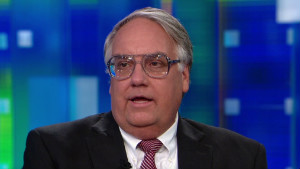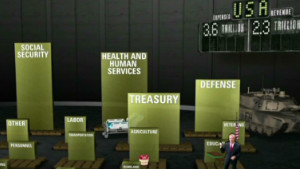The White House proposal would leave lower tax rates in place for everyone except those earning $400,000 or more a year. Republican leaders had asked for a higher limit but the offer suggests there is a narrowing in the gap between the two sides.
Read more: Obama, Boehner move closer on taxes, spending cuts
A person familiar with the talks also said Mr Obama was no longer seeking a permanent mechanism to increase the US debt limit, but would settle for a two-year increase in America's borrowing authority. In a further concession to Republicans, Mr Obama agreed to apply a less generous measure of inflation to government calculation, which would result in lower benefits in the Social Security pension scheme over time, the person added.
 Expert: World won't end due to cliff
Expert: World won't end due to cliff See how government spends your money
See how government spends your money Fiscal cliff talks intensify
Fiscal cliff talks intensifyThe White House plan came as the shape of a deal to avert the US fiscal cliff -- which would entail a mix of $600bn in spending cuts and tax increases next year -- was at last emerging, with at least $1tn in new taxes, up to $1tn in fresh spending cuts and an increase in America's debt ceiling. Negotiators are scrambling to reach an agreement before the end-of-the-year deadline.
Read more: Boehner offers to extend debt limit for a year
Mr Obama and John Boehner, Republican speaker of the House of Representatives, held their third face-to-face meeting in eight days at the White House amid signs of growing momentum in the talks. Tim Geithner, Treasury secretary, was also present. After details of Mr Obama's new offer emerged, a spokesman for Mr Boehner rejected the bid, saying it "cannot be considered balanced".
But he added that it represented a "step in the right direction" and expressed hope that discussions with Mr Obama would continue. A person familiar with Mr Obama's proposal stressed it was not the White House's final offer, leaving room for more compromise.
Read more: Fiscal cliff delays holiday homecoming for Congress
If Mr Obama and Mr Boehner strike a deal in the coming days, and are able to secure passage through Congress, that would remove a huge cloud of uncertainty hanging over the global economy.
Failure to avoid the fiscal cliff would probably tip the US into a recession next year, a prospect that has alarmed investors around the world as well as the US public.
Signs the two sides may be getting closer together helped give a positive mood to the US equity market. The S&P 500 closed up 1.2 per cent on Monday at 1,430, its best level of the day.
The market has largely traded up or down in line with expectations for a deal, though some traders are beginning to argue that a range of outcomes are baked into equity prices. Progress in the talks followed the deadly shootings at a school in Connecticut on Friday that stunned the country, diverting attention from the budget battle and quieting the rhetoric on taxes and spending.
If an agreement is reached between the president and Mr Boehner, it will only be the first step, however. Mr Boehner may face challenges in winning approval for a deal in the House if he is perceived by conservative members to have made too many concessions on taxes. Mr Boehner is expected to discuss the talks with members of his party at a meeting on Tuesday.
Some Democrats may also balk at the terms of any deal if they believe Mr Obama compromised too aggressively on spending cuts. Given these challenges, Harry Reid, Senate majority leader, said lawmakers in the upper chamber would probably have to return to Washington after Christmas to work on approving fiscal cliff legislation.
An important breakthrough came over the weekend when Mr Boehner offered to allow tax rates for millionaires to rise from 35 per cent to 39.6 per cent, abandoning his party's long-held opposition to the tax rate increases Mr Obama has been demanding. Overall, Mr Boehner is offering a package worth nearly $1tn in new revenue, including about $500bn to be achieved through a tax reform process that would limit tax breaks and deductions next year.
While this is still short of the $1.2tn in revenue the president is now demanding, it significantly narrows the differences between the two sides, leaving room for negotiations on the final details in the coming days. With Mr Obama raising his threshold for higher taxes on the wealthy on Monday, the sides appear to be converging towards a final target that could be to begin tax increases at the $500,000 or $750,000 level. Mr Obama is also proposing a similar tax reform process for both individuals and corporations to what Mr Boehner has put on the table to extract additional revenue.
Beyond taxes, Mr Obama and Mr Boehner still have to settle on the nature of spending cuts, including to popular government health and pension programmes, which Republicans view as essential to any package but many Democrats resist.